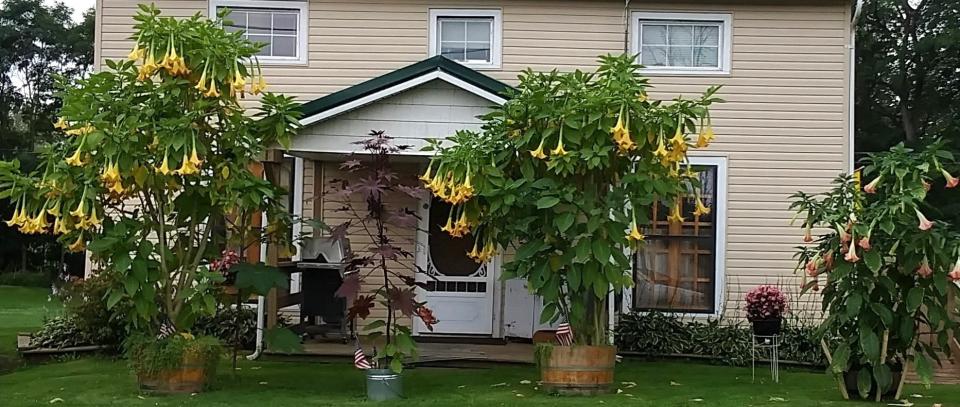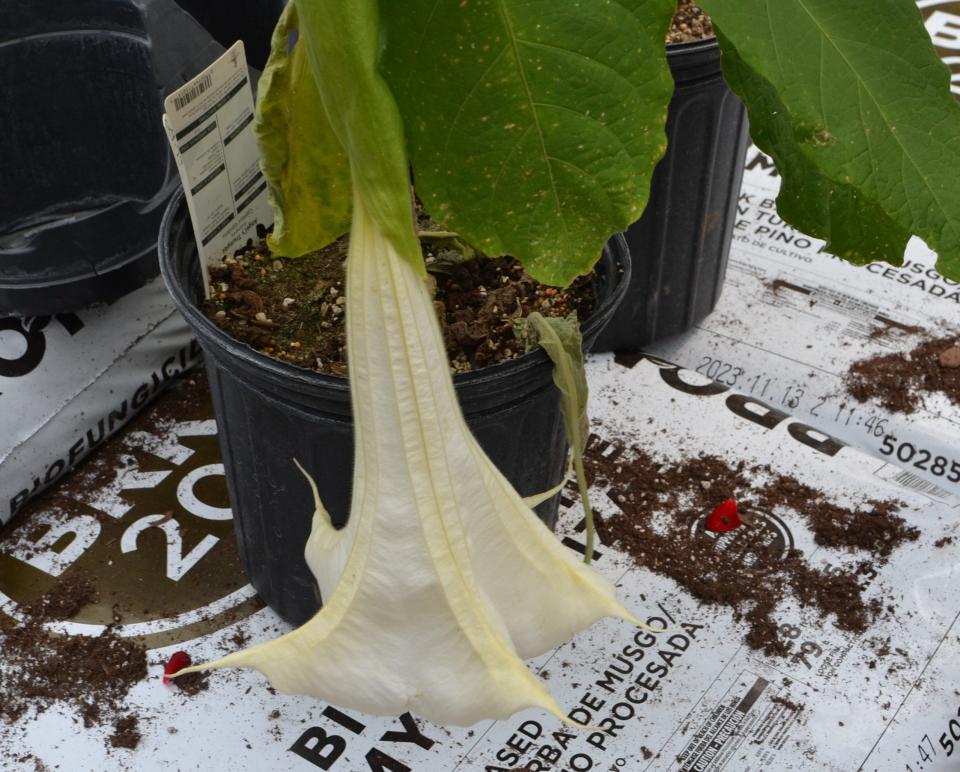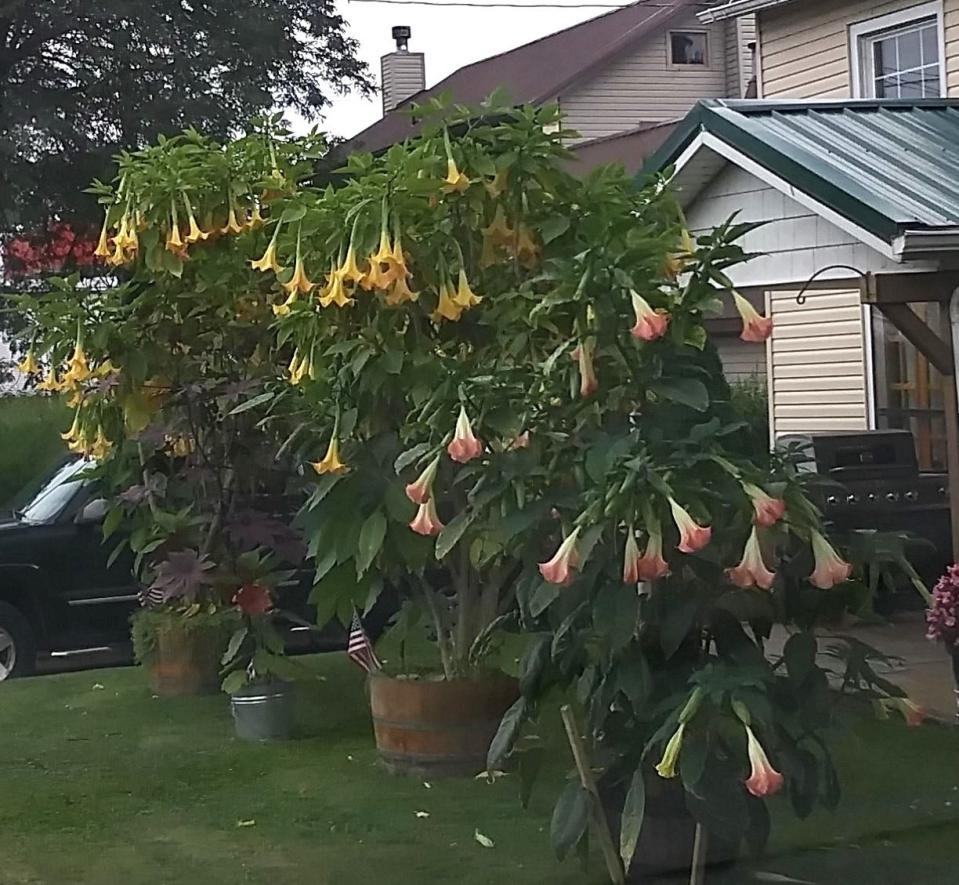A Stroll Through the Garden: The call of the angel's trumpet
A friend and reader asked me a question about a flowering shrub she saw on the edge of Jeromesville a number of years ago. The plant was growing in a large pot and had the biggest trumpet-shaped blooms she had ever seen, which were there yet again this past summer. I saw the same huge shrub on many trips I made driving toward Mansfield.
My friend wanted to know what it was and what I could tell her about it. It was at least 8 feet to maybe 10 feet tall with 18- to 24-inch long and had pink trumpet flowers.
This past week I got an email from a reader in Ethiopia. He came across my column and was in the process of buying plants for his yard. The question he asked was whether the angel's trumpet plant was safe. I want all my friends who are growing the plant to know it's well worth it and, with a normal number of constraints, you should have no problems.

My parents had two angel’s trumpets, or Brugmansia spp., for more than 10 years. One had a pink flower and the other was white. They were both fairly easy to grow, and the white-blossomed plant had a pleasant, sweet scent with a little lemon overtone during summer evenings. My parents said they liked the plants, but it was a challenge to constantly haul the small tree into the house each season. The ones my parents kept were 4-6 feet tall. I remember moving them more than once.
Handle with care
There are good things and bad things about the beautiful plant. The angel’s trumpet is a member of the nightshade family, which means it can be poisonous. Some plant experts consider the angel’s trumpet the most poisonous plant of all tropical plants you may grow. If you eat even small amounts of the plant as an adult you could die a very painful death.
Personally, I want to spare you the way the tropane alkaloids affect a person who has eaten any portion of this plant. The alkaloids are called scopolamine, atropine and hyoscyamine. One of the other things we need to know is most of the alkaloids are serious medicines in the hands of doctors when applied properly.

As I said, my parents kept two different Angel’s Trumpets for over 10 years and had all kinds of grandkids and great-grandkids around the plants and never had any poisonous plant problems. Most kids know not to eat tomato plants and just eat the tomato. Don’t let the kids play with the plants. All said and done, I would use caution. I would care for the plant wearing gloves.
The rewards are an incredible flower and an amazing scent. The challenges and rewards were worth it. A report from the National Library of Medicine says between 1978 and 2013 there were only 10 cases of hospitalization because of a mistake in an herbal tea mix worldwide. Most parents will be careful in handling this plant and provide for the safety measures required.
A plant that needs some pampering
The angel’s trumpet is a heavy feeder and does best with organic fertilizers. My parents found success with worm castings and kelp as a bi-weekly, mild fertilizing routine. The best thing to keep in mind is the plant will produce a large bloom and need to be fed. The small-to-medium trees can grow from 3 to 35 feet tall in its native areas from Chile to Argentina. Based on the latest information, the plant is extinct in its native ranges.
When we grow these plants in pots, they will need to be pruned. Tomatoes and angel’s trumpet are both easy to start from cuttings, which means starts or cuttings should root fairly easily. Therefore, you can pass out cuttings from the plant fairly easily and have new ones to back it up.

I remember moving the 5-feet angel’s trumpet "trees" in through my parent’s front door, through the dining room, through the hall and into the living room. After 35-plus years of doing this sort of thing, we have developed systems for moving the plants, but it never has been super easy. Because the plant roots so easily, if you could start them from cuttings and root them in the spring, you wouldn’t have to drag them into the house every winter.
I hope you have a nice stroll through your garden this week and if you have any questions let me know by e-mail at [email protected]. You can find links at my website to my various blogs which are converted columns at ohiohealthyfoodcooperative.org.
Eric Larson of Jeromesville is a veteran landscaper and gardening enthusiast and a founding board member of the Ohio Chapter of Association of Professional Landscape Designers.
This article originally appeared on Mansfield News Journal: Angel's trumpet plants bring colorful blooms to your garden